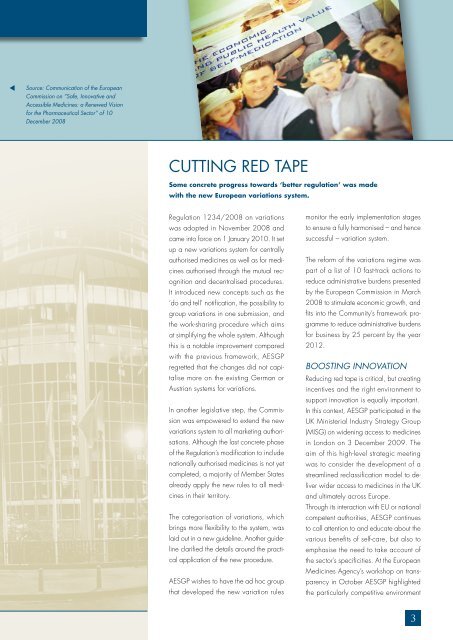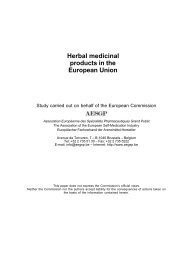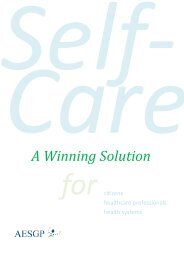2009-2010 - AESGP
2009-2010 - AESGP
2009-2010 - AESGP
You also want an ePaper? Increase the reach of your titles
YUMPU automatically turns print PDFs into web optimized ePapers that Google loves.
s<br />
Source: Communication of the European<br />
Commission on “Safe, Innovative and<br />
Accessible Medicines: a Renewed Vision<br />
for the Pharmaceutical Sector” of 10<br />
December 2008<br />
CuTTInG rEd TAPE<br />
Some concrete progress towards ‘better regulation’ was made<br />
with the new European variations system.<br />
Regulation 1234/2008 on variations<br />
was adopted in November 2008 and<br />
came into force on 1 January <strong>2010</strong>. It set<br />
up a new variations system for centrally<br />
authorised medicines as well as for medicines<br />
authorised through the mutual recognition<br />
and decentralised procedures.<br />
It introduced new concepts such as the<br />
‘do and tell’ notification, the possibility to<br />
group variations in one submission, and<br />
the work-sharing procedure which aims<br />
at simplifying the whole system. Although<br />
this is a notable improvement compared<br />
with the previous framework, <strong>AESGP</strong><br />
regretted that the changes did not capitalise<br />
more on the existing German or<br />
Austrian systems for variations.<br />
In another legislative step, the Commission<br />
was empowered to extend the new<br />
variations system to all marketing authorisations.<br />
Although the last concrete phase<br />
of the Regulation’s modification to include<br />
nationally authorised medicines is not yet<br />
completed, a majority of Member States<br />
already apply the new rules to all medicines<br />
in their territory.<br />
The categorisation of variations, which<br />
brings more flexibility to the system, was<br />
laid out in a new guideline. Another guideline<br />
clarified the details around the practical<br />
application of the new procedure.<br />
<strong>AESGP</strong> wishes to have the ad hoc group<br />
that developed the new variation rules<br />
monitor the early implementation stages<br />
to ensure a fully harmonised – and hence<br />
successful – variation system.<br />
The reform of the variations regime was<br />
part of a list of 10 fast-track actions to<br />
reduce administrative burdens presented<br />
by the European Commission in March<br />
2008 to stimulate economic growth, and<br />
fits into the Community’s framework programme<br />
to reduce administrative burdens<br />
for business by 25 percent by the year<br />
2012.<br />
BOOSTING INNOVATION<br />
Reducing red tape is critical, but creating<br />
incentives and the right environment to<br />
support innovation is equally important.<br />
In this context, <strong>AESGP</strong> participated in the<br />
UK Ministerial Industry Strategy Group<br />
(MISG) on widening access to medicines<br />
in London on 3 December <strong>2009</strong>. The<br />
aim of this high-level strategic meeting<br />
was to consider the development of a<br />
streamlined reclassification model to deliver<br />
wider access to medicines in the UK<br />
and ultimately across Europe.<br />
Through its interaction with EU or national<br />
competent authorities, <strong>AESGP</strong> continues<br />
to call attention to and educate about the<br />
various benefits of self-care, but also to<br />
emphasise the need to take account of<br />
the sector’s specificities. At the European<br />
Medicines Agency’s workshop on transparency<br />
in October <strong>AESGP</strong> highlighted<br />
the particularly competitive environment<br />
3




